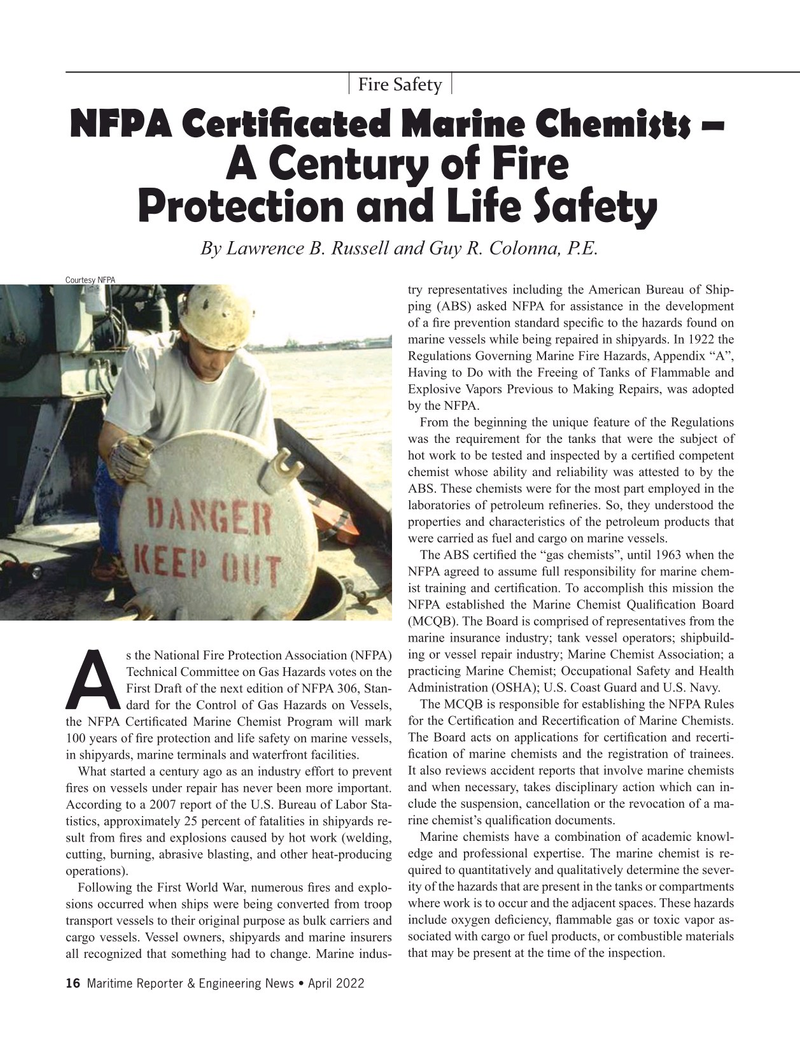
Page 16: of Maritime Reporter Magazine (April 2022)
Offshore Energy
Read this page in Pdf, Flash or Html5 edition of April 2022 Maritime Reporter Magazine
Fire Safety
NFPA Certi? cated Marine Chemists –
A Century of Fire
Protection and Life Safety
By Lawrence B. Russell and Guy R. Colonna, P.E.
Courtesy NFPA try representatives including the American Bureau of Ship- ping (ABS) asked NFPA for assistance in the development of a ? re prevention standard speci? c to the hazards found on marine vessels while being repaired in shipyards. In 1922 the
Regulations Governing Marine Fire Hazards, Appendix “A”,
Having to Do with the Freeing of Tanks of Flammable and
Explosive Vapors Previous to Making Repairs, was adopted by the NFPA.
From the beginning the unique feature of the Regulations was the requirement for the tanks that were the subject of hot work to be tested and inspected by a certi? ed competent chemist whose ability and reliability was attested to by the
ABS. These chemists were for the most part employed in the laboratories of petroleum re? neries. So, they understood the properties and characteristics of the petroleum products that were carried as fuel and cargo on marine vessels.
The ABS certi? ed the “gas chemists”, until 1963 when the
NFPA agreed to assume full responsibility for marine chem- ist training and certi? cation. To accomplish this mission the
NFPA established the Marine Chemist Quali? cation Board (MCQB). The Board is comprised of representatives from the marine insurance industry; tank vessel operators; shipbuild- s the National Fire Protection Association (NFPA) ing or vessel repair industry; Marine Chemist Association; a
Technical Committee on Gas Hazards votes on the practicing Marine Chemist; Occupational Safety and Health
First Draft of the next edition of NFPA 306, Stan- Administration (OSHA); U.S. Coast Guard and U.S. Navy.
A dard for the Control of Gas Hazards on Vessels, The MCQB is responsible for establishing the NFPA Rules the NFPA Certi? cated Marine Chemist Program will mark for the Certi? cation and Recerti? cation of Marine Chemists. 100 years of ? re protection and life safety on marine vessels, The Board acts on applications for certi? cation and recerti- in shipyards, marine terminals and waterfront facilities. ? cation of marine chemists and the registration of trainees.
What started a century ago as an industry effort to prevent It also reviews accident reports that involve marine chemists ? res on vessels under repair has never been more important. and when necessary, takes disciplinary action which can in-
According to a 2007 report of the U.S. Bureau of Labor Sta- clude the suspension, cancellation or the revocation of a ma- tistics, approximately 25 percent of fatalities in shipyards re- rine chemist’s quali? cation documents.
sult from ? res and explosions caused by hot work (welding, Marine chemists have a combination of academic knowl- cutting, burning, abrasive blasting, and other heat-producing edge and professional expertise. The marine chemist is re- operations). quired to quantitatively and qualitatively determine the sever-
Following the First World War, numerous ? res and explo- ity of the hazards that are present in the tanks or compartments sions occurred when ships were being converted from troop where work is to occur and the adjacent spaces. These hazards transport vessels to their original purpose as bulk carriers and include oxygen de? ciency, ? ammable gas or toxic vapor as- cargo vessels. Vessel owners, shipyards and marine insurers sociated with cargo or fuel products, or combustible materials all recognized that something had to change. Marine indus- that may be present at the time of the inspection.
16 Maritime Reporter & Engineering News • April 2022
MR #4 (1-17).indd 16 4/5/2022 12:42:59 PM

 15
15

 17
17
